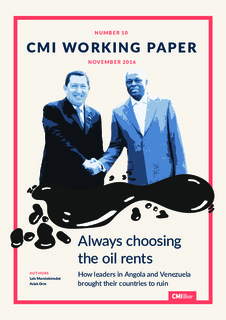Always choosing the oil rents: How leaders in Angola and Venezuela brought their countries to ruin
Working paper
Permanent lenke
http://hdl.handle.net/11250/2475287Utgivelsesdato
2016-11-01Metadata
Vis full innførselSamlinger
- Publications [1488]
Originalversjon
Bergen: Chr. Michelsen Institute (CMI Working Paper WP 2016:10) 28 p.Sammendrag
Angola and Venezuela are among the most oil dependent countries in the world. When oil prices fell in 2014, these states lost half of their income base. A combined economic, political and social crisis followed. The acute problems in both countries, however, originate in the political economy that developed through decades of the black gold bonanza. Angola and Venezuela are very different polities, yet aside from oil dependency, the countries also share many traits: Authoritarian and presidentialist rule, political polarisation, deindustrialisation, import dependency, weak civil societies and the astronomical corruption levels. This paper will discuss the gravity of the situation in the two countries and their deep roots in the political economy of oil. We argue that in many respects, the decline in Venezuela’s institutions made it take on many of the forms and shapes that for some time had characterised Angola. Above all, the Venezuelan presidency came to take the form of a personalised hegemony imbued with a self-styled Constitutional legitimacy, much like what was already in place in Angola. We here argue that among the many expressions of the “resource curse” in these countries, there was always an element of crucial political choice: the leaders always chose to revert to the oil rents as the primary way of underpinning their increasing personal power at the expense of existing or de jure institutions, and increasing oil dependency.
